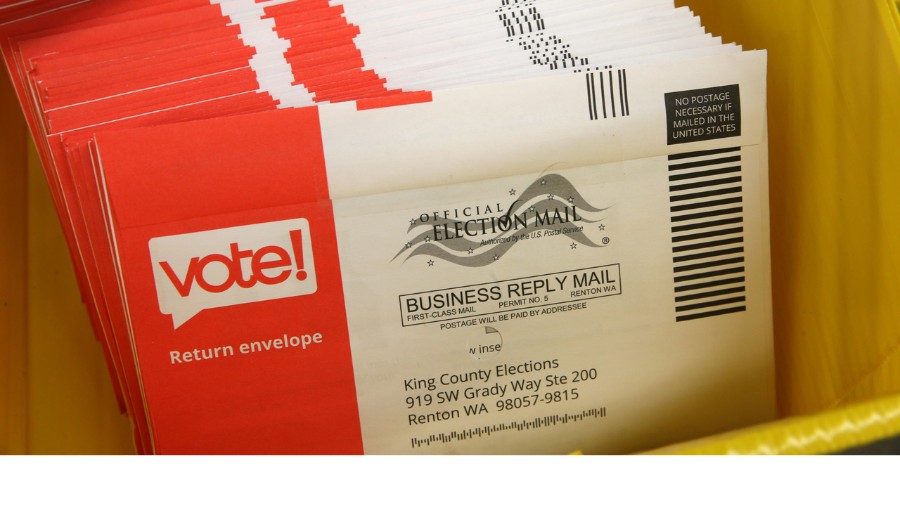Ranking the future: WA lawmakers eye overhaul of local elections with ranked choice voting
Jan 29, 2025, 5:52 AM | Updated: 11:09 am

A elections ballot official counts votes in Washington. (Photo courtesy of ����Xվ 7)
(Photo courtesy of ����Xվ 7)
Right now, most elections in Washington are simple: Voters pick one candidate, and whoever gets the most votes wins.
But is looking to shake things up by introducing ranked choice voting to local elections. An attempt to implement ranked choice voting failed during the 2024 legislative session, but democratic lawmakers have brought it back, hoping the second time is the charm.
With ranked choice voting, voters don’t just pick their favorite; they rank candidates in order of preference. This means the winner isn’t just the top vote-getter — they’re someone who earns broader support through second or third-choice votes.
It’s a more collaborative, big-picture approach to elections, and supporters claim it’s a better way to ensure leaders represent the true majority.
More from Olympia: Washington aims to curb drunk driving with bold civil protection orders
In November 2022, Seattle voters approved a ballot measure to use ranked choice voting in primary elections for City of Seattle offices, including the Mayor, City Attorney and City Council, but it won’t start until August 2027.
HB 1448 would start statewide on July 24 if passed by the Legislature. It had its first public hearing in front of the House State Government & Tribal Relations on Tuesday.
How ranked choice voting works
Ranked choice voting changes the game by giving voters more say.
Instead of being forced to choose just one candidate — sometimes out of fear their favorite “can’t win” — voters can rank candidates with a first, second and third-place vote. If nobody gets more than 50% of the first-choice votes, the lowest-ranked candidate is eliminated.
Then, voters who picked that candidate as their top choice have their second choice counted instead. This process continues until one candidate crosses the finish line with a majority. It’s designed to reflect what voters really want, rather than settling for whoever manages to squeak by with a simple plurality.
Compare this to the current system in Washington, where the top vote-getter wins even if they only snag 35% of the votes in a crowded field.
During a hearing on House Bill 1448, Robert Bristow-Johnson criticized the instant runoff voting method, citing examples from Vermont and Alaska where it failed to elect the candidate with the most votes.
More from Matt Markovich: Some Washington lawmakers push for campus abortion access during bill’s first hearing
“A minority of voters were able to prevail in the election by getting their candidate elected,” he said.
Treveon Parish, a youth leader, supported ranked choice voting, highlighting its potential to increase youth voter turnout. Colin Cole emphasized ranked choice voting’s security and audibility, referencing data from cities like San Francisco and Portland. Vivian Olson of Edmonds said ranked choice voting will give non-incumbents a better shot at winning.
“I’m excited for a voting future where everyone who wants to be on council runs in a single pool of candidates for all seats,” Olson said. “This method will sometimes do away with the extra cost of a primary election, reduce negative campaigning and will encourage more people to run for office as running for a position is much less intimidating than running against an incumbent.”
But Sharon Hanek said ranked choice voting is too confusing for voters to understand.
“How can I explain proportional voting or approval voting to an immigrant family that has just learned English?” Hanek told lawmakers during the hearing. “I do not believe that the current system of one ballot, one vote, winner-takes-all is a broken system. I can explain how to fill out your ballot in one sentence and not in five minutes of talking.”
Pierce County adopted ranked choice voting in 2006, but went back to the traditional winner-takes-all approach three years later.
What’s in House Bill 1448?
House Bill 1448 is not a statewide mandate — it’s more of a local-choice model, allowing communities to decide if they’re ready to make the switch.
For those who opt in, the bill sets some clear guidelines: Ballots must be easy to understand, vote-counting processes must be straightforward and the transition has to happen within two years of adoption.
To help local governments figure it all out, the bill creates a ranked choice voting work group. This group will assist the secretary of state with developing training and voter education materials, so everyone — from election officials to voters — knows how the system works. It’s about ensuring the transition is smooth, not overwhelming.
Racing into trouble: New Washington bill targets chronic speeders
Learning from other states
Washington wouldn’t be the first to experiment with ranked choice voting. Cities across the U.S. have already embraced it, and their experiences offer a glimpse of what might be possible here. San Francisco, Minneapolis, New York City and Portland, Oregon, have all successfully implemented ranked choice voting for local elections.
And it’s not just big cities. States like Maine and Alaska have gone even further, using ranked choice voting for statewide elections, including congressional races.
The bill faces a final committee vote in the next couple of days.
Matt Markovich often covers the state legislature and public policy for ����Xվ Newsradio. You can read more of Matt’s stories here. Follow him on , or email him here














